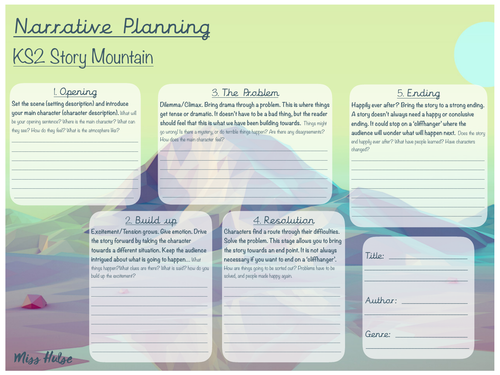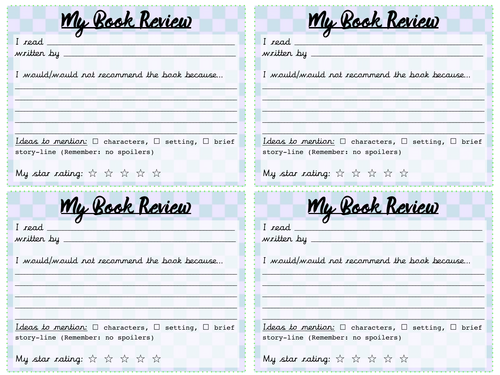143Uploads
19k+Views
18k+Downloads
English

Creative Writing Story Mountain Resource (KS2)
This is a great resource which I’ve used for multiple creative writing tasks, particularly short stories.
It includes the key elements of a story, with prompts and a brief description of what is usually in each.
Once the scaffolding is used, I often encourage my higher attainers to think how they could move away from the scaffold, perhaps using the ending as a beginning for example.
Elements of the story mountain:
Opening
Build Up
The Problem
Resolution
Ending

Cow print display labels
These are my new cow print display labels, which I’m using on my own displays this year. Hope you enjoy.
Miss Hulse ✿

My Book Review
I have created this resource for pupils to review books that they have read. I’m hoping these will act as inspiration for others in my class and will provide a love for reading.
I’m going to display these within my reading corner and perhaps create a floor book with them in.

Co-ordinating and subordinating conjunction poster pack (KS2)
A set of two posters with the classic FANBOYS and ISAWAWABUB acronyms reimagined in my style to support conjunction use.

How to punctuate direct speech poster (KS2)
A step-by-step visual poster on how to punctuate direct speech.

How to punctuate using commas poster (KS2)
A step-by-step visual poster on how to punctuate using commas.

How to punctuate using brackets poster (KS2)
A step-by-step visual poster on how to punctuate using brackets.

How to punctuate using dashes poster (KS2)
A step-by-step visual poster on how to punctuate using dashes.

Apostrophes (KS2)
This lesson is part of my SPaG (Spelling, Punctuation and Grammar - sometimes abbrieviated to GPS) collection. This lesson focuses on apostrophes, but also contains some further grammar practice. This lesson was created completely independently and was created purely to plug gaps in my pupils knowledge.
I tend to get my class to complete a baseline for SPaG, so I know where to target.
Resource bundle includes: Lesson Powerpoint (PDF) and any accompanying resources.
Slide one: Title page
Slide two: Question 1: apostrophes
Slide three: Apostrophes questioning
Slide four: Apostrophes
Slide five to six: Apostrophes teach
Slide seven: Question 25: Apostrophes
Slide eight: Contraction Task
Slide nine: Contraction Task feedback (answers)
Slide ten: Possession Task
Slide eleven: Possession Task feedback (answers)

English - And Tango Makes Three L10 (Upper KS2)
This lesson is the final from a really lovely English scheme of work for upper KS2, using the book ‘And Tango Makes Three’, inspired by HertsforLearning and adapted for my class. There are ten lessons in total.
(01.03.23) UPDATE: PowerPoint Available to edit (please note this may need slight reformatting depending on your font settings)
Resource bundle includes: Lesson Powerpoint (PDF) and accompanying resources. I’ve also included my Medium Term Plan for the entire scheme!
Slide one: Title page
Slide two: Learning Intention and Targets for Success
Slide three: Starter
Slide four: Text Focus
Slide five: Let’s Read
Slide six: Plenary
Slide seven: Let’s Discuss
I hope you love this book as much as me and my pupils did!

Sentence Types and Punctuation (KS2)
This lesson is part of my SPaG (Spelling, Punctuation and Grammar - sometimes abbrieviated to GPS) collection. This lesson focuses on sentence types and punctuation, but also contains some further grammar practice. This lesson was created completely independently and was created purely to plug gaps in my pupils knowledge.
I tend to get my class to complete a baseline for SPaG, so I know where to target.
Resource bundle includes: Lesson Powerpoint (PDF) and any accompanying resources.
Slide one: Title page
Slide two: Basic punctuation learn
Slide three: Sentence learn
Slide four: Sentence types learn
Slide five: Question 1: Punctuation/Sentence Types
Slide six: Question 2: Punctuation
Slide seven: Question 15: Punctuation
Slide eight: Question 17: Sentence Types
Slide nine: Question 27: Sentence Types
Slide ten: Question 28: Punctuation
Slide eleven: Question 31: Punctuation/Sentence Types
Slide twelve: Sentence types practice
Slide thirteen: Sentence types practice feedback (answers)
Slide fourteen: Punctuation practice
Slide fifteen: Punctuation practice feedback (answers)

Semi-colons and Conjunctions (KS2)
This lesson is part of my SPaG (Spelling, Punctuation and Grammar - sometimes abbrieviated to GPS) collection. This lesson focuses on semi-colons and conjunctions, but also contains some - further grammar practice. This lesson was created completely independently and was created purely to plug gaps in my pupils knowledge.
I tend to get my class to complete a baseline for SPaG, so I know where to target.
Resource bundle includes: Lesson Powerpoint (PDF) and any accompanying resources.
Slide one: Title page
Slide two: Question 7: Punctuation
Slide three: Semi-colon teach
Slide four: Question 43: Punctuation
Slide five: Question 2: Semi-colon
Slide six: Question 8: Expanded Noun Phrase
Slide seven: Question 49: Noun Phrase
Slide eight: Question 9: Word Class
Slide nine: Question 18: Word Class
Slide ten: Question 13: Word Class
Slide eleven: Question 10: Conjunction
Slide twelve: Question 33: Conjunction
Slide thirteen: Semi-colon task

Direct Speech (KS2)
This lesson is part of my SPaG (Spelling, Punctuation and Grammar - sometimes abbrieviated to GPS) collection. This lesson focuses on Direct Speech, but also contains some further grammar practice. This lesson was created completely independently and was created purely to plug gaps in my pupils knowledge.
I tend to get my class to complete a baseline for SPaG, so I know where to target.
Resource bundle includes: Lesson Powerpoint (PDF) and any accompanying resources.
Slide one: Title page
Slide two: Direct Speech Video Link
Slide three to six: Important features of direct speech
Slide seven: Question 21: Punctuation
Slide eight: Task
Slide nine: Task feedback (answers)

Clauses (KS2)
This lesson is part of my SPaG (Spelling, Punctuation and Grammar - sometimes abbrieviated to GPS) collection. This lesson focuses on clauses, but also contains some further grammar practice. This lesson was created completely independently and was created purely to plug gaps in my pupils knowledge.
I tend to get my class to complete a baseline for SPaG, so I know where to target.
Resource bundle includes: Lesson Powerpoint (PDF) and any accompanying resources.
Slide one: Title page
Slide two to three: Starter
Slide three: Question 8: main clauses
Slide four: Clauses
Slide five: Question 23: Subordinate clauses
Slide six: Question 32: Clauses
Slide seven to eight: Clauses tasks

Adverbs (KS2)
This lesson is part of my SPaG (Spelling, Punctuation and Grammar - sometimes abbrieviated to GPS) collection. This lesson focuses on adverbs, but also contains some further grammar practice. This lesson was created completely independently and was created purely to plug gaps in my pupils knowledge.
I tend to get my class to complete a baseline for SPaG, so I know where to target.
Resource bundle includes: Lesson Powerpoint (PDF) and any accompanying resources.
Slide one: Title page
Slide two: Question 9: adverbs
Slide three: Adverbs
Slide four: Question 9: adverbs
Slide five: Question 18: word class
Slide six: Question 13: word class
Slide seven: Question 50: adverbs
Slide eight: Adverbs task
Slide nine: Adverbs task feedback (answers)

English - And Tango Makes Three L1 (Upper KS2)
This lesson is the first from a really lovely English scheme of work for upper KS2, using the book ‘And Tango Makes Three’, inspired by HertsforLearning and adapted for my class. There are ten lessons in total.
(01.03.23) UPDATE: PowerPoint Available to edit (please note this may need slight reformatting depending on your font settings)
Resource bundle includes: Lesson Powerpoint (PDF) and accompanying resources. I’ve also included my Medium Term Plan for the entire scheme!
Slide one: Title page
Slide two: Learning Intention and Targets for Success
Slide three: Starter
Slide four: Text Focus
Slide five: Let’s Read
Slide six: Plenary
Slide seven: Let’s Discuss
I hope you love this book as much as me and my pupils did!

Spellings - Homophones (Upper KS2)
This lesson is part of my SPaG (Spelling, Punctuation and Grammar - sometimes abbrieviated to GPS) collection.
This lesson is the fifth spelling lesson focusing on homophones. I followed the Herts for Learning Spelling scheme to create these resources.
Resource bundle includes: Lesson Powerpoint (PDF), a lesson resource including model sentences and also a wordsearch with all of the weeks words in. There are ten spellings per week.
Slide one: Title page
Slide two and three: Weekly Overview
Slide four: Spelling practice using techniques
Slide five: Find the definitions task
Slide six: Spelling in context - sentences activity
Slide seven: Word search with the spellings activity

Spellings Year 3/4 Spellings Recap (Upper KS2)
This lesson is part of my SPaG (Spelling, Punctuation and Grammar - sometimes abbrieviated to GPS) collection.
This lesson is the first spelling lesson focusing on the year 3/4 spellings. I followed the Herts for Learning Spelling scheme to create these resources.
Resource bundle includes: Lesson Powerpoint (PDF), a lesson resource including model sentences and also a wordsearch with all of the weeks words in. There are ten spellings per week.
Slide one: Title page
Slide two: Week 1 Overview
Slide three: Spelling practice using techniques
Slide four: Find the definitions task
Slide five: Spelling in context - sentences activity
Slide six: Word search with the spellings activity

Determiners (KS2)
This lesson is part of my SPaG (Spelling, Punctuation and Grammar - sometimes abbrieviated to GPS) collection. This lesson focuses on determiners, but also contains some further grammar practice. This lesson was created completely independently and was created purely to plug gaps in my pupils knowledge.
I tend to get my class to complete a baseline for SPaG, so I know where to target.
Resource bundle includes: Lesson Powerpoint (PDF) and any accompanying resources.
Slide one: Title page
Slide two: Question 4: Determiners
Slide three: Determiners
Slide four: Question 11: word class
Slide five: Determiners task




















